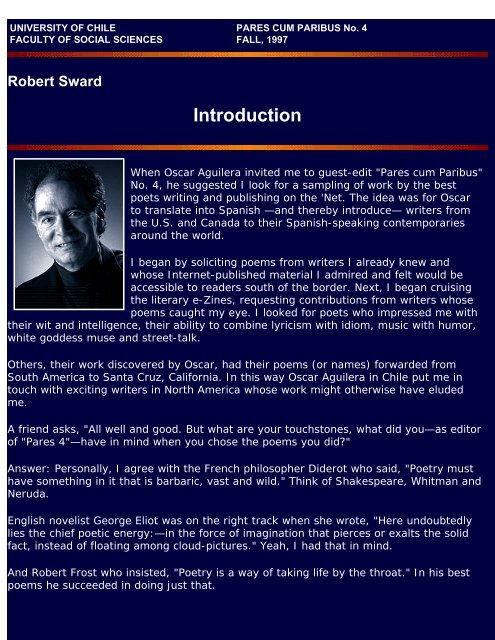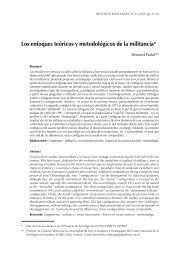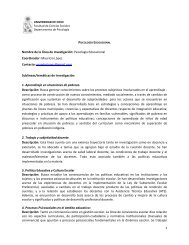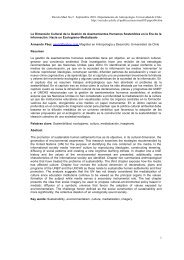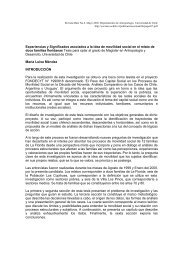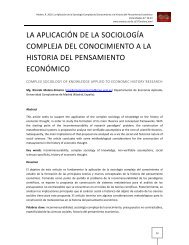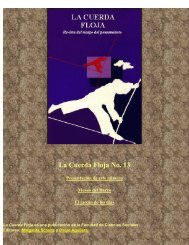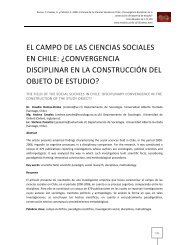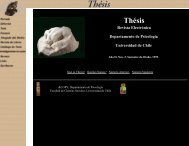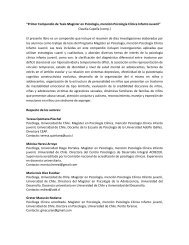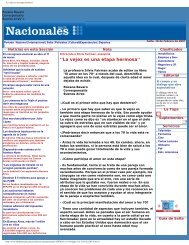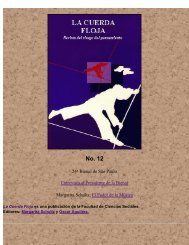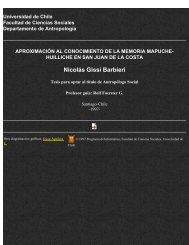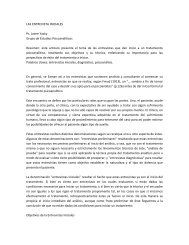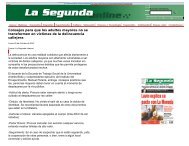- Page 1 and 2: Presentación de Robert Sward, Edit
- Page 3 and 4: Bob Holman The Death of Poetry—
- Page 5 and 6: SECCIÓN ESPECIAL Teatro Latino del
- Page 7 and 8: Como siempre, desafortunadamente (a
- Page 9: Y Allen Ginsberg que escribió: "La
- Page 13 and 14: choices avoiding its self evident b
- Page 15 and 16: F. call your own yes you stand for
- Page 17 and 18: F. Achilles! Before I fell, the bac
- Page 19 and 20: the shape my breath makes I am the
- Page 21 and 22: anguish frivolity worthlessness pai
- Page 23 and 24: Distance and silver dance with us a
- Page 25 and 26: on me like light, that I might read
- Page 27 and 28: UNIVERSIDAD DE CHILE FACULTAD DE CI
- Page 29 and 30: UNIVERSIDAD DE CHILE FACULTAD DE CI
- Page 31 and 32: UNIVERSIDAD DE CHILE FACULTAD DE CI
- Page 33 and 34: UNIVERSITY OF CHILE FACULTY OF SOCI
- Page 35 and 36: UNIVERSIDAD DE CHILE FACULTAD DE CI
- Page 37 and 38: UNIVERSITY OF CHILE FACULTY OF SOCI
- Page 39 and 40: UNIVERSITY OF CHILE FACULTY OF SOCI
- Page 41 and 42: UNIVERSITY OF CHILE FACULTY OF SOCI
- Page 43 and 44: UNIVERSITY OF CHILE FACULTY OF SOCI
- Page 45 and 46: UNIVERSIDAD DE CHILE FACULTAD DE CI
- Page 47 and 48: whirls below a white-washed sky in
- Page 49 and 50: her touch of calculus and honey a b
- Page 51 and 52: F. of disappearing sound. Finally,
- Page 53 and 54: F. Htm diagramación, gráficos, Os
- Page 55 and 56: F. Htm diagramación, gráficos, Os
- Page 57 and 58: F. Htm diagramación, gráficos, Os
- Page 59 and 60: UNIVERSIDAD DE CHILE FACULTAD DE CI
- Page 61 and 62:
Possibly I will be stuffed and moun
- Page 63 and 64:
UNIVERSIDAD DE CHILE FACULTAD DE CI
- Page 65 and 66:
a mi hijo y a sus hijos; todo lo qu
- Page 67 and 68:
and in violent dreams 2. If you sea
- Page 69 and 70:
2. Si me buscas en esta fría exten
- Page 71 and 72:
Htm diagramación, gráficos, Oscar
- Page 73 and 74:
un paso más allá en cualquier dir
- Page 75 and 76:
Htm, graphics, Oscar Aguilera F. Sh
- Page 77 and 78:
Htm diagramación, gráficos, Oscar
- Page 79 and 80:
including a chauffeur with ice-blue
- Page 81 and 82:
a las bodas de plata de una amiga n
- Page 83 and 84:
El día estaba calmado y brumoso, F
- Page 85 and 86:
You, the busy one, with important t
- Page 87 and 88:
volcano And heres where the sun ste
- Page 89 and 90:
(read below dotted line only if you
- Page 91 and 92:
Lullabye, the world useta be sure i
- Page 93 and 94:
Htm and graphics, Oscar Aguilera F.
- Page 95 and 96:
Inflando el globo como un padre en
- Page 97 and 98:
un lugar helado, cálido y solitari
- Page 99 and 100:
UNIVERSITY OF CHILE FACULTY OF SOCI
- Page 101 and 102:
UNIVERSIDAD DE CHILE FACULTAD DE CI
- Page 103 and 104:
UNIVERSITY OF CHILE FACULTY OF SOCI
- Page 105 and 106:
UNIVERSIDAD DE CHILE FACULTAD DE CI
- Page 107 and 108:
UNIVERSITY OF CHILE FACULTY OF SOCI
- Page 109 and 110:
UNIVERSIDAD DE CHILE FACULTAD DE CI
- Page 111 and 112:
UNIVERSITY OF CHILE FACULTY OF SOCI
- Page 113 and 114:
UNIVERSIDAD DE CHILE FACULTAD DE CI
- Page 115 and 116:
Htm diagramación, gráficos, Oscar
- Page 117 and 118:
stuffs cotton in the baby's mouth.
- Page 119 and 120:
F. Htm diagramación, gráficos, Os
- Page 121 and 122:
UNIVERSIDAD DE CHILE FACULTAD DE CI
- Page 123 and 124:
UNIVERSIDAD DE CHILE FACULTAD DE CI
- Page 125 and 126:
UNIVERSIDAD DE CHILE FACULTAD DE CI
- Page 127 and 128:
F. Htm diagramación, gráficos, Os
- Page 129 and 130:
UNIVERSIDAD DE CHILE FACULTAD DE CI
- Page 131 and 132:
UNIVERSIDAD DE CHILE FACULTAD DE CI
- Page 133 and 134:
floating on the sea of humanity, fo
- Page 135 and 136:
UNIVERSIDAD DE CHILE FACULTAD DE CI
- Page 137 and 138:
-Creo que ya nos vamos -dije. -Uste
- Page 139 and 140:
Htm diagramación, gráficos, Oscar
- Page 141 and 142:
quería. Recordó a Pedro con delei
- Page 143 and 144:
Htm diagramación, gráficos, Oscar
- Page 145 and 146:
es larga, no solo me saludaban. Con
- Page 147 and 148:
UNIVERSIDAD DE CHILE FACULTAD DE CI
- Page 149 and 150:
UNIVERSIDAD DE CHILE FACULTAD DE CI
- Page 151 and 152:
No volvió nunca más, Amanda. Simp
- Page 153 and 154:
pero él lleva la cuenta de los cho
- Page 155 and 156:
Lo destapó, le abrió las piernas
- Page 157 and 158:
Al tercer día, después de ubicarm
- Page 159 and 160:
UNIVERSITY OF CHILE FACULTY OF SOCI
- Page 161 and 162:
Htm and graphics, Oscar Aguilera F.
- Page 163 and 164:
Como consecuencia de tales ajustes,
- Page 165 and 166:
UNIVERSITY OF CHILE FACULTY OF SOCI
- Page 167 and 168:
demonstrate his desire to join me f
- Page 169 and 170:
He introduced himself, and gave me
- Page 171 and 172:
armpits. She wore a Snoopy watch an
- Page 173 and 174:
not so in life. I booked a one-way
- Page 175 and 176:
calles, volver a la vida predecible
- Page 177 and 178:
Jesús dijo que Paul debería contr
- Page 179 and 180:
De pronto sentí frío, y por prime
- Page 181 and 182:
Avenida Sexta rumbo a ver una pelí
- Page 183 and 184:
Mercedes Benítez Sánchez La Llave
- Page 185 and 186:
ninguna importancia, sólo quería
- Page 187 and 188:
Sergi enmudeció tras su larga hist
- Page 189 and 190:
UNIVERSIDAD DE CHILE FACULTAD DE CI
- Page 191 and 192:
Rodrigo la mira un instante, apriet
- Page 193 and 194:
—Mi padre lo sabía... por eso me
- Page 195 and 196:
UNIVERSIDAD DE CHILE FACULTAD DE CI
- Page 197 and 198:
— Les doy a todos las gracias —
- Page 199 and 200:
¿Qué pasó? Pues se me antojó es
- Page 201 and 202:
Tomé las mismas maletas con las qu
- Page 203 and 204:
un aperitivo: «¿pisco sour o vain
- Page 205 and 206:
—¡Cálmate!, no vayas a llorar.
- Page 207 and 208:
—¿Qué será del guatón?, ¿Por
- Page 209 and 210:
—Pero si no cantaba nada de bien
- Page 211 and 212:
Pensé mucho por todos —mi único
- Page 213 and 214:
por restaurar valores perdidos en e
- Page 215 and 216:
esencialmente habla estadounidense
- Page 217 and 218:
Stafford. Si casi todos los eventos
- Page 219 and 220:
cosas extrínsecas a ella sino los
- Page 221 and 222:
la doctrina de la inducción. Esta
- Page 223 and 224:
nociones y principios seguros para
- Page 225 and 226:
en muchos párrafos maneja de maner
- Page 227 and 228:
Ahora bien, la conexión que deseá
- Page 229 and 230:
general, espontánea y vivaz, y est
- Page 231 and 232:
¡Escríbanos! Si tiene dificultade
- Page 233 and 234:
● 1991-92 Proyecto de Estudio del
- Page 235 and 236:
Autores Aguirre, Margarita Nació e
- Page 237 and 238:
del Canal Ojancos". Desde esa fecha
- Page 239 and 240:
Internacional CICLA, Perú. El pail
- Page 241 and 242:
Aloud: Voices from the Nuyorican Po
- Page 243 and 244:
Dickinson." elogiada por el poeta R
- Page 245 and 246:
Recent winner of the Tucson Poetry
- Page 247 and 248:
F. Htm diagramación, gráficos, Os
- Page 249 and 250:
tengan un significado especial. El
- Page 251 and 252:
UNIVERSITY OF CHILE FACULTY OF SOCI
- Page 253 and 254:
Portada del Novum Organum de Bacon
- Page 255 and 256:
ARGUMENTUM FABULE* Clymestram (1) G
- Page 257 and 258:
24 Cal.- Immo uero contra, ne dubit
- Page 259 and 260:
michi det premii (50)*. Heus, affer
- Page 261 and 262:
78 Cor.- Nomen horrendum (66) et id
- Page 263 and 264:
quam primum (87)* illam uiderim. [S
- Page 265 and 266:
156 Gla.- Hicne tuus est filius, qu
- Page 267 and 268:
omniaque michi conducunt ad pellend
- Page 269 and 270:
206 Pol.- Quedam me anus uenientem
- Page 271 and 272:
uidear. Nunc certe si alias redieri
- Page 273 and 274:
in hac re, quam primum captandum es
- Page 275 and 276:
251 Climestra.- ¡Qué alegría!;
- Page 277 and 278:
puedas decidir qué es lo que más
- Page 279 and 280:
Los números entre paréntesis remi
- Page 281 and 282:
omnis noster residet* ignis; nec ue
- Page 283 and 284:
ut facile sit michi donare, neque s
- Page 285 and 286:
47 Lib.- Nunquid non me noscis (54)
- Page 287 and 288:
72 Cor.- Non istud esse queat, ut l
- Page 289 and 290:
105 Lib.- Bibo, ne me crucies. (82)
- Page 291 and 292:
133 Cal.- Aduenio festinans. Quis e
- Page 293 and 294:
ut me aliquando tui causa pudeat. H
- Page 295 and 296:
Sed quid nunc agis? 185 Cal.- Audie
- Page 297 and 298:
non miror, en utrem amplissimum por
- Page 299 and 300:
220 Cly.- Cur ita, mater? 221 Gla.-
- Page 301 and 302:
235 Cal.- Abi intro teque domi reci
- Page 303 and 304:
Habes nunc rem a principio; nunc co
- Page 305 and 306:
272 Gla.- Tu modo roges, Calimacha.
- Page 307 and 308:
el consejo de hacer a Liburno colon
- Page 309 and 310:
14 Calímaca.- ¡Arriba el ánimo,
- Page 311 and 312:
por la belleza corporal o con ruego
- Page 313 and 314:
Hoy apenas me he ganado el sustento
- Page 315 and 316:
66 Corinto.- Pero ¿qué estoy espe
- Page 317 and 318:
contratar a nadie para mañana. 98
- Page 319 and 320:
no son las dos; no puedo esperar m
- Page 321 and 322:
146 Calímaca.- ¿A mí? 147 Glauca
- Page 323 and 324:
colaboración; nuestra persona y to
- Page 325 and 326:
verdad. ¡Ruego que los dioses me s
- Page 327 and 328:
202 Calímaca.- Por cierto creo que
- Page 329 and 330:
andes indecorosamente por la calle
- Page 331 and 332:
237 Climestra.- ¡Yo, madre; abro d
- Page 333 and 334:
mente hasta el punto de que, sea lo
- Page 335 and 336:
granjearás un excelente tutor en e
- Page 337 and 338:
-Mamá, ¿puedo ser monaguillo? -pr
- Page 339 and 340:
UNIVERSIDAD DE CHILE FACULTAD DE CI
- Page 341 and 342:
quid rei (parlamento 3): En cuanto
- Page 343 and 344:
prácticamente insostenible, sin ve
- Page 345 and 346:
elipsis, ver Hofmann, Latín, § 51
- Page 347 and 348:
subjuntivo cupias sólo se puede ju
- Page 349 and 350:
he (parlamento 44): Casas ve errada
- Page 351 and 352:
parte, aquí se esperaría comedamu
- Page 353 and 354:
Latín, §§ 17 y 59). erubeas (par
- Page 355 and 356:
vertical, también breve. Que esta
- Page 357 and 358:
hec (parlamento 238): La conjetura
- Page 359 and 360:
clymestram scripsi : climestre S No
- Page 361 and 362:
hiemem Casas : yemem S; uid. adn. e
- Page 363 and 364:
attigeret S : atting- tacite Casas;
- Page 365 and 366:
anas conieci : auis uel anis S faci
- Page 367 and 368:
imaginibus scripsi ; ym- S propius
- Page 369 and 370:
igiditas Lida : rug- S fera S : ser
- Page 371:
sustineant S : an sustinent? num S
- Page 374 and 375:
UNIVERSIDAD DE CHILE FACULTAD DE CI
- Page 377 and 378:
UNIVERSIDAD DE CHILE FACULTAD DE CI
- Page 379 and 380:
UNIVERSIDAD DE CHILE FACULTAD DE CI
- Page 381 and 382:
Htm diagramación, gráficos, Oscar
- Page 383 and 384:
—Pero si ellos no tienen la culpa
- Page 385 and 386:
UNIVERSIDAD DE CHILE FACULTAD DE CI
- Page 387 and 388:
No te avisé luego de mi llegada y
- Page 389 and 390:
ja, ja! ¡Y ahora te asustas!" Qué
- Page 391 and 392:
medidas contra..." "La situación e
- Page 393 and 394:
UNIVERSIDAD DE CHILE FACULTAD DE CI


